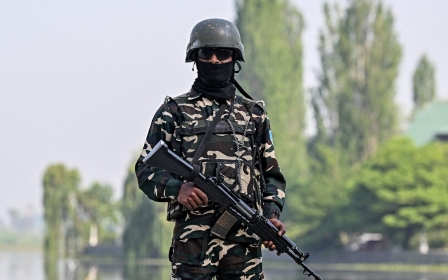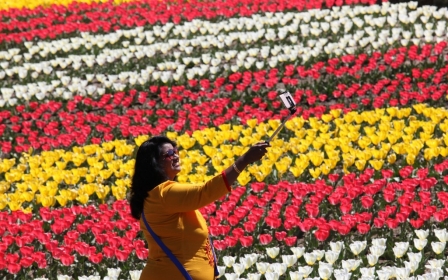Kashmir elections: Can change prevail in a climate of repression?

Kashmiris are returning to the ballot boxes in a phased process through early October, marking the region’s first legislative assembly elections in a decade.
This is also the first vote since India’s right-wing government in 2019 stripped Kashmir of its semi-autonomous status and downgraded it from a state to a union territory.
For Kashmiris, the election thus presents an opportunity to express their disapproval of India’s policies, rejecting what many perceive as an attempt to “Hinduise” the Muslim-majority region by engineering demographic change.
The sweeping changes to Kashmir’s status five years ago were followed by widespread repression of political groups, civil society and media, with those perceived as dissenters or protesters frequently harassed by police or detained under harsh anti-terrorism laws.
Ahead of the elections, Amnesty International warned that Indian authorities were running a “campaign of harassment and intimidation” against dissenting voices in the region, and using arbitrary detentions to create a climate of fear in Jammu and Kashmir.
New MEE newsletter: Jerusalem Dispatch
Sign up to get the latest insights and analysis on Israel-Palestine, alongside Turkey Unpacked and other MEE newsletters
In 2022, the region’s electoral boundaries were changed, with 43 seats allocated for the Jammu division and 47 for the Kashmir division. In addition, the electoral commission added 2.5 million new voters to the rolls after relaxing domicile restrictions, reinforcing fears that Prime Minister Narendra Modi’s government was trying to alter Kashmir’s demographics by encouraging Hindu migration, while disenfranchising locals.
In the wake of the assassination of Hezbollah leader Hassan Nasrallah in an Israeli air strike, hundreds of Kashmiris took to the streets denouncing the killing of the Lebanese leader and in favour of the Palestinian resistance.
Many religious and political leaders expressed grief about the killing with some politicians cancelling their election campaigns as a "mark of protest".
The elections are being held in three phases: polling began on 18 September, and will continue on 25 September and 1 October. Results are expected within a week of the final polling date.
Facade of legitimacy
Although most pro-Delhi political parties have endorsed the decision to hold elections, residents remain sceptical.
The legislative assembly’s limited powers, along with the unresolved question of restoring statehood and the improbability of reversing the disempowerment seen over the last five years, have left many questioning whether this vote can bring any meaningful change.
Amid ongoing repression, militarisation and hyper-surveillance, the electoral exercise is widely perceived as a futile process that provides only a facade of legitimacy for Delhi’s controversial legal changes.
Amid ongoing repression, militarisation and hyper-surveillance, the electoral exercise is widely perceived as a futile process
"Civic elections cannot be a means to conflict resolution. These are two separate matters," Kashmiri political leader Mirwaiz Mohammad Umar Farooq told the Indian magazine Outlook, noting that the soon-to-be-elected legislature will be "almost powerless".
Mirwaiz also said that India’s crackdown in the region has left people "powerless and disempowered" and in such a scenario a "poll boycott cannot work anymore".
Despite such scepticism, there is still a push to vote against Modi’s ruling Bharatiya Janata Party (BJP), with parties framing the vote as a means to defend Kashmir’s land and identity against the BJP’s Hindutva agenda.
The Indian National Congress and the Jammu and Kashmir National Conference (JKNC) joined hands in a pre-poll alliance, aiming to defeat the BJP and its allies. But major parties have positioned themselves as a counter to the BJP in the past, only to subsequently team up with Modi, as the Jammu and Kashmir People’s Democratic Party (PDP) did in 2014. (The alliance collapsed several years later.)
This time around, parties are also vowing to work towards the restoration of the region’s statehood and autonomous status, while protecting jobs for local residents.
The PDP’s manifesto calls for the resolution of the Kashmir issue as a means of lifting residents out of the persistent cycle of violence and unrest. The party is also calling for the restoration of dialogue and regional cooperation between India and Pakistan.
Opinions divided
In recent years, Kashmiris have grown increasingly fearful that through its programme of legislative changes, Indian authorities are pushing for demographic change - something locals have compared to a "Gaza-esque" situation for those who continue to oppose India’s authority and rule in the valley.
With no widespread electoral boycott movement as the region has seen in years past, the current vote has also marked the re-entry into the race of Jamaat-e-Islami, a group likened to Egypt’s Muslim Brotherhood by its political opponents. The party was banned in 2019 for a five-year period after a major suicide attack in Pulwama town killed more than 40 Indian soldiers.
The party’s entry into this year’s elections has divided opinions, with some welcoming the move, and others viewing it as a surrender that aids the BJP’s election engineering to defeat the main opposition in Kashmir.
Critics say the Modi government is making a concerted effort to fragment the electoral landscape of the Kashmir region by backing several independent candidates while consolidating its own vote share in the Jammu region.
In Kulgam, a hotspot for protests and clashes, a Jamaat-e-Islami candidate is contesting the vote against Communist Party of India-Marxist leader M Y Tarigami, a key opponent of the BJP who is backed by the Congress-JKNC alliance. Such electoral machinations have increased cynicism among locals, who recognise the BJP’s efforts to engineer outcomes for electoral gains.
Another major issue surrounding the elections is the unjust detention of hundreds of Kashmiris, with the JKNC promising to prioritise the release of “political prisoners and youth who have been unjustly detained in jails and are not involved in serious crimes”.
Kashmiri politician Sheikh Abdul Rashid, who was jailed in 2019 on charges of funding “terrorism”, won a seat in India’s parliament earlier this year, described by some as a “vote for resistance”. But his recent release on bail, allowing him to campaign for his party in the upcoming assembly elections, has been viewed with suspicion, amid accusations that it will bolster the BJP’s bid to split the vote.
Overall, the notion that these polls are a fair test of Kashmiri opinion in the present climate of dispossession, disempowerment and intimidation is implausible. There are clear doubts about the electoral exercise, reinforced by the various mechanisms employed by the Modi government to render Kashmiri votes irrelevant. The ultimate outcome remains uncertain, much like Kashmir’s political future.
The views expressed in this article belong to the author and do not necessarily reflect the editorial policy of Middle East Eye.
Middle East Eye delivers independent and unrivalled coverage and analysis of the Middle East, North Africa and beyond. To learn more about republishing this content and the associated fees, please fill out this form. More about MEE can be found here.






